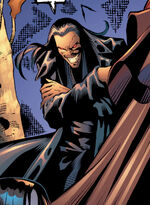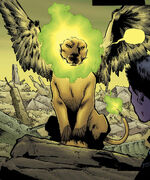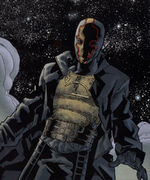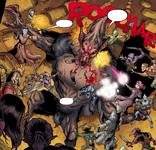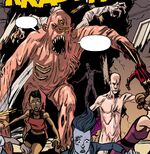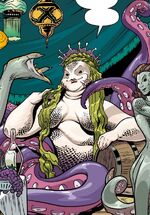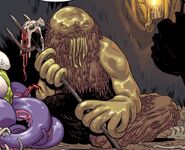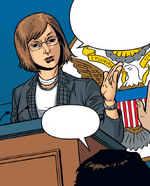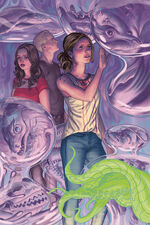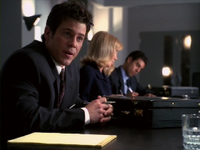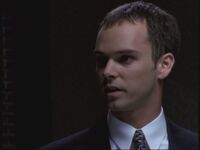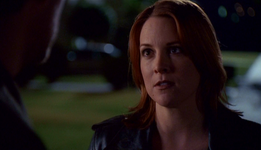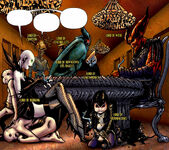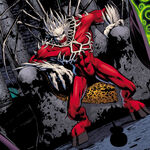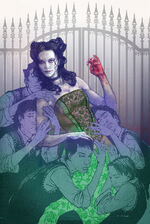(→Season Eleven: update) Tag: Visual edit |
No edit summary Tag: Visual edit |
||
| Line 7: | Line 7: | ||
For some of the show, the seasons followed a pattern in which lesser villains, presumed to be the Big Bad, are introduced, only to later lead to the more powerful surprise Big Bad: near the beginning of the season, a villain would appear to be a Big Bad and absorbs much of the heroes’ attention, until, suddenly, this "Little Bad" is rid of and replaced by the Big Bad, usually about halfway through the season. |
For some of the show, the seasons followed a pattern in which lesser villains, presumed to be the Big Bad, are introduced, only to later lead to the more powerful surprise Big Bad: near the beginning of the season, a villain would appear to be a Big Bad and absorbs much of the heroes’ attention, until, suddenly, this "Little Bad" is rid of and replaced by the Big Bad, usually about halfway through the season. |
||
| − | ==''Buffy the Vampire Slayer'': Big Bads and Little Bads== |
+ | === '''''Buffy the Vampire Slayer'': Big Bads and Little Bads''' === |
Big Bad is a term originally used by the ''[[Buffy the Vampire Slayer]]'' television series to describe a major recurring adversary, usually the chief villain or antagonist in a particular broadcast season. It has since been used to describe annual villains in other television series, and has also been used in scholarly work discussing ''Buffy the Vampire Slayer''. |
Big Bad is a term originally used by the ''[[Buffy the Vampire Slayer]]'' television series to describe a major recurring adversary, usually the chief villain or antagonist in a particular broadcast season. It has since been used to describe annual villains in other television series, and has also been used in scholarly work discussing ''Buffy the Vampire Slayer''. |
||
Revision as of 16:42, 6 February 2018
- “I hate to break it to you, O Impotent One, but you’re not the ‘Big Bad’ anymore. You’re not even the ‘Kind of Naughty’.”
- ―Xander Harris (to Spike)[src]
Big Bad is a term applied to describe major villains on Buffy the Vampire Slayer and Angel. Specifically, it is usually accepted to refer to the single villain that, in each season of Buffy, is the dominant and final one.
The Big Bad is typically not only dangerous, as most of them threaten some version of apocalypse, but also help articulate the major themes of the season. Some of the Big Bads are built up and present from the season’s beginning (or earlier) — i.e., the Master — and others are sprung as a surprise near the end of the season — i.e., Angelus.
For some of the show, the seasons followed a pattern in which lesser villains, presumed to be the Big Bad, are introduced, only to later lead to the more powerful surprise Big Bad: near the beginning of the season, a villain would appear to be a Big Bad and absorbs much of the heroes’ attention, until, suddenly, this "Little Bad" is rid of and replaced by the Big Bad, usually about halfway through the season.
Buffy the Vampire Slayer: Big Bads and Little Bads
Big Bad is a term originally used by the Buffy the Vampire Slayer television series to describe a major recurring adversary, usually the chief villain or antagonist in a particular broadcast season. It has since been used to describe annual villains in other television series, and has also been used in scholarly work discussing Buffy the Vampire Slayer.
This pattern in action:
The Movie/"The Origin"
Season One
The Master is established as the season’s biggest threat since the beginning, but isn’t able to perform direct acts until the season finale. Until then, he commanded over the Order of Aurelius, in special the vampire Darla, to prepare and fulfill the prophecy for his return. When his battle against Buffy Summers finally takes place, the Master succeeds in killing the Slayer, and, alongside his minions, begins the apocalypse on Earth. Buffy, though, triumphs when she’s resuscitated and become able to kill the Master herself.
- Big Bad
- Little Bad
Season Two
The duo Spike and Drusilla arrive at Sunnydale to take place of the Master (and the Anointed One) as the new master vampires to defeat the Slayer. Their threat is manifested in direct battles and sending minions against Buffy and her friends, but it’s not until the loss of Angel’s soul that the season’s Big Bad is revealed, who takes a place of leadership over the two vampires. Before the final battle, Angelus’s apocalypse is opposed by Spike, who becomes a reluctant ally with the Slayer, and parts with Drusilla. Angelus is defeated by the restoration of his soul, and his apocalypse averted with his own death.
Season Three
The previously unseen mayor of Sunnydale is revealed as an apocalyptic threat, counting on the service of his allies Mr. Trick and Faith Lehane to prepare for his ascension. Buffy deals with the vampire and the rogue Slayer, having the final battle against the Big Bad Richard Wilkins, who successfully became a pure demon. The Scooby Gang defeats him and his army of vampires with the help of the Class of '99, and exploded his demon form.
- Big Bad
- Little Bad
Season Four
The Scooby Gang is initially suspicious of the Initiative’s operating mode, but it’s not until Maggie Walsh attempt to kill Buffy Summers that their intentions are revealed. Her threat is short-lived, as Dr. Walsh’s secret project, Adam, kills his own creator. As the Big Bad, Adam assumes the position of dominance in Sunnydale upon vampires, and attempts to cause the death of both humans and demons, in order to create an army of bio-mechanical demonoids.
- Big Bad
- Little Bad
Season Five
Glorificus is revealed as the biggest threat in this season, not only for her apocalyptic intentions of opening all gates between dimensions, but her interests in sacrificing the Slayer’s younger sister, Dawn Summers. The Goddess counted on her minions assistance, but the Scooby Gang were also forced to deal against the Knights of Byzantium, due to their radically conflicting solutions against Glory. Despite being able to defeat the Goddess in the final battle, her apocalypse had already began, which Buffy averts with her own death.
- Big Bad
- Little Bad
Season Six
Despite the constant threat of the Trio against the Slayer, specially their relentless leader Warren Mears, their own threat caused the manifestation of Dark Willow. The witch not only then kills Warren, goes against the two remaining members, battle her own friends in the Scooby Gang, but she brings the beginning of her own apocalypse.
- Big Bad
- Little Bad
Season Seven
The First Evil returns with an attempt to completely eliminate the Slayer line, and gain corporeal form to dominate the Earth. For this, he counts on his minions, the Bringers, and manipulative manifestations of deceased characters, but his main threat against Buffy were the priest Caleb and an army of Turok-Hans.
- Big Bad
- Little Bad
Season Eight
The Twilight persona was leader of a miscellaneous group manipulated to act against Slayers all over the world. These members had their own intentions and agendas, but the seasons’ final threat and Big Bad is revealed through the manifestation of the real Twilight, a dimension’s sentience, who caused its own birth, and Earth’s consequential downfall. The apocalypse is only averted when Buffy destroys the Seed of Wonder, provoking the end of magic and imprisoning Twilight in his own dimension.
- Big Bad
- Twilight
- Little Bad
Season Nine
The Big Bads Simone Doffler and Severin teams up in order to invade the Deeper Well and concretize their own plans. The Siphon wishes to absorb magic enough to turn back time, potentially causing an apocalypse, while the rogue Slayer attempts to become an unnaturally powerful vampire. Simone awakens Maloker, the Old One father of vampires, but her Slaypire form is staked by Buffy. Maloker, though, imminently conquering Earth’s surface, is only stopped by the power of the siphon’s sacrifice, alongside Illyria, in the creation of the new Seed of Wonder.
- Big Bad
- Little Bad
Season Ten
The unholy triumvirate of the Soul Glutton, the Mistress, and the Sculptor is formed in order to take vengeance of the Scooby Gang and command over an apocalypse on Earth. The Big Bad, though, is only revealed when D'Hoffryn himself manages to kill the demons, but also assassinating the Magic Council, in attempt to accumulate the power for himself, take vengeance from the Scoobies, and dominate the Earth. Through the magic rules of the Vampyr book, Buffy and her friends are able to defend themselves from the lower being, and successfully kill him.
- Big Bad
- Little Bad
Season Eleven
Joanna Wise, leader of the Pandora Project, is revealed as the responsible for summoning the Shenlong, in order to cause San Francisco’s destruction and the public controversy on magic, with the final intention to have the power of a ruler in a world that no one would have access to magic but her. While confronted by the Scooby Gang, she once again summoned the dragon to absorb its power, but, with the Scoobies’ help, it sough out its magic and devoured her. The battle and her confession being filmed, Wise and her Project were publicly exposed, the people involved were punished, and all policies regarding the supernatural reviewed.
- Big Bad
- Little Bad
Angel: Big Bads and Little Bads
For Angel, the law firm Wolfram & Hart was the Big Bad present in the series; however, there were other major recurring threats that arose, those of which were either associates of Wolfram & Hart or a third party with its own agenda. While the format of the series didn’t stick to an established Big Bad the way Buffy did, several characters and elements have represented significant season arcs, using the "Big Bad" term frequently. The pattern of this was as follows:
Season One
- Big Bad
- Little Bads
Season Two
- Big Bad
- Little Bad
Season Three
- Big Bad
- Little Bad
Season Four
Season Five
- Big Bad
- Little Bad
After the Fall
- Big Bad
- Little Bad
Angel (IDW series)
- Big Bad
- Little Bad
Angel & Faith
Angel & Faith Season Ten
Season 11
- To be revealed
Spike: Big Bads and Little Bads
Spike received a lot of comic book series that have disputable canon, therefore creating official new Big Bads and treating it as some kind of a second spin-off.
Spike: Asylum
- Big Bad
Spike: Shadow Puppets
- Big Bad
Spike: After the Fall
- Big Bad
Spike: The Devil You Know
- Big Bad
Spike (IDW series)
- Big Bad
- Little Bad
Trivia
- The term was based on the episode "Bewitched, Bothered and Bewildered," in which Buffy Summers described the newly soulless Angel as “the big bad thing in the dark.” The expression “big bad” itself was first used on screen in episode "Gingerbread," in which Buffy said an occult symbol was harmless, “not a big bad.”
- “Big Bad” was then often used in relation to Spike: Xander told him “I hate to break it to you, O Impotent One, but you’re not the Big Bad anymore.” ("Doomed"), he teased Harmony saying “Look at you, all puffed and mighty, thinking you’re the new Big Bad.” ("Real Me"), he refereed to himself while explaining “I just thought she’d be safer with Big Bad lookin’ over her shoulder.” ("Blood Ties"), Buffybot was programmed to say “Oh Spike, you’re the big bad!” ("Intervention"), he explained “You can’t feel it unless you’re into the big bad — a witch or a vampire or—” ("Wrecked"), and he declared about himself “Big Bad’s back and lookin’ for a little death.” ("Beneath You").
- At the end of the Season 7 episode "Lessons," the First Evil appeared in the form of the previous six seasons’ Big Bads (or significant “little bads”), in reverse chronological order: Warren Mears (season 6), Glorificus (season 5), Adam (season 4), Richard Wilkins (season 3), Drusilla (season 2), and The Master (season 1).
- A special cover for comic issue The Spread of Their Evil features Buffy fighting its most recent Big Bad with previous Big Bads (or significant “little bads”) laying defeated: the Master, Spike, Drusilla, Angel, Richard Wilkins, Adam, Glorificus, Warren Mears, Caleb, Twilight, Severin, Simone Doffler, and D'Hoffryn.
- Darla was the only member of the Whirlwind to not play a significant antagonist role in the second season of Buffy the Vampire Slayer.
- The term has been adopted by several other series:
- Wikipedia lists several examples.
- The Supernatural Wiki has a page on its own Big Bads.
- The TV Tropes Wiki lists many more examples.


